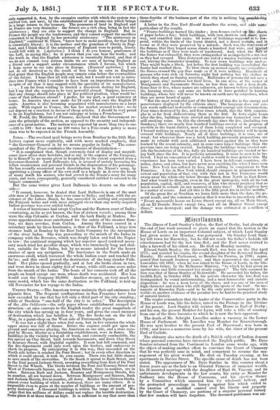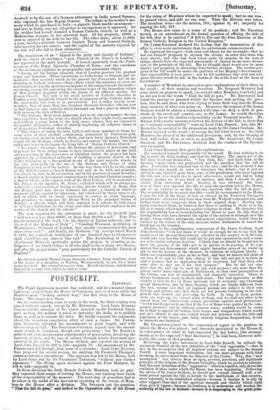311torrtlfturnto.
The illness of Lord Stanley's father, the Earl of Derby, had already at the end of last week assumed so grave an aspect that the motion in the House of Lords on an important Colonial subject, of which Lord Stanley had given notice for Monday, was postponed. On Sunday Lord Stan- ley left town for Knowsley, but he did not reach his father's bedside till consciousness had for the last time fled ; and the Earl never revived to take a farewell of his eldest son. He died on Monday morning. Edward Smith Stanley, the thirteenth Earl, was born on the 21st April 1775 ; and married his cousin, the second daughter of the Reverend Geoffrey Hornby. He entered Parliament, as Member for Preston, in 1796; repre- sented that borough fourteen years ; and then represented the county of Lancashire till 1832; when he was raised to the House of Lords, in the life- time of his father, by the Melbourne Ministry, "to which he had given an unobtrusive and little remarked but steady support." The title assumed by him was that of Baron Stanley of Bickerstaffe. He succeeded his father, the twelfth Earl, in October 1834. In his private character the late Earl was distinguished by sound understanding, and a most honourable and amiable disposition : he was a keen lover of the chace, and was one of the men of high character and station who still dignify the sports of the turf: the me- nagerie at Knowsley Park—said to be the only private menagerie in the world—is another evidence of the peculiar love he had for the practical study of natural history. The reader remembers that the leader of the Conservative party in the House of Lords was, like his father, raised to the Peerage in the lifetime of his parent : Lord Stanley will reenter the House as Earl of Derby ; and his son, the present Member for Lynn, will take a title of courtesy from one of the three baronies to which he is now the heir-apparent.
The death of Mr. Sebright Lascelles makes a vacancy in the Lower House of Parliament. Mr. Lascelles was Member for Knaresborough. He was next brother to the present Earl of Harewood ; was burn in 1798 ; and leaves a numerous issue by his wife, the sister of the present Earl of Carlisle.
The obituary also notes the death of a British subject of Indian descent whose personal concerns have interested the English public. Mr. Dyce Sombre returned from the Continent to London some weeks ago, with the object of making another effort to convince the Court of Chancery that he was perfectly sane in mind, and competent to resume the ma- nagement of his great wealth. He died on Tuesday evening, at -his apartments in Davies Street. The specific cause of death has not been stated. The appearance of Mr. Dyce Sombre in this country about a dozen years ago as the heir to an Oriental Princess of immense wealth, his ill-assorted marriage with the daughter of Earl St. Vincent, and its unfortunate developments in the law courts, his entry as Member for
Sudbury into the House of Commons, and his ejection thence by a Committee which unseated him for wholesale bribery, and
the protracted proceedings in lunacy against him which ended in the exercise of a modified control over his liberty and property by the Court of Chancery, are portions of a singular personal history that few readers will have forgotten. The deceased gentleman was un- derstood to be the son of a German adventurer in India named Sumner, who espoused the late Begum Oomroo. Thetribute to his mother's me- mory which he purchased in Italy—a gigantic black marble monument— and sent to India, was not altogether so incongruous as it appeared ; for his mother had herself founded a Roman Catholic church, as well as a Mahometan mosque, in her ancestral land. Of his property, 40001. a year is enjoyed by his wife for her life. The other share, about 11,0001. a year becomes divisible between Captain Troup and General Soldroli, who married his two sisters ; and the capital of the annuity enjoyed by his wife will also fall to them ultimately.
The translation of an " Appeal to the piety and charity of Italians," with the object of erecting a " new Church of St. Peter's in London," has appeared in the daily journals. It issued apparently from the Print- ing-press of the Royal Apostolic Chamber of Rome : and the exordium of the document explains its propagandist and missionary object. " Among all the foreign missions, that of London presents the greatest hopes and demands. Those conversions to Catholicism so frequent and re- markable—that necessity which in the present day Protestants feel for in- struction in Catholic concerns—those efforts which the ministers of error are now making to stop the spontaneous impulse of the nation towards the truth— are strong reasons for conceiving the sweetest hopes of the immediate return of that prodigal daughter within the bosom of its afflicted mother, the Roman Church. Not only is the small number of Catholic churches in London a very formidable obstacle to the propagation of the Catholic faith in the metropolis, but even to its preservation. Let it suffice merely to re- member, that of more than two hundred thousand Catholics who are now in that immense city, scarcely thirty thousand can find a place to attend the holy mass on the days of festival. " The Italians, there most numerous, feel in an especial manner the loss they experience from the want of a church where they might freely assemble and without expense listen to the holy mass; whence they are exposed to the painful alternative, either of entirely neglecting all religious duties or of frequenting Protestant churches.
" This danger of losing the holy faith is still more manifest to them, be- cause some of their apostate countrymen, stimulated by Protestant gold, are trying every means to seduce them, and have lately opened a Protestant temple for the Italians, which, to deceive and ensnare the simple, has been called and bears on its facade the lying title of Italian Catholic Church.' " To remove, therefore, from the Italians the danger of perversion, and to procure for them fitting means to keep themselves st adfast in the faith and persevering in the observance of Christian duties, the project has been approved by ecclesiastical authority of building a spacious church in the centre of London, in a fine position in one of the most majestic streets in the city, principally for the use of the Italians, and thence of other foreigners, as well as of the natives. In this way there will be in the capital of the British empire a church Roman not only in its faith and principle, but also in its rites. in its ceremonies, and in the practices of sound devotion ; a church similar in its material construction to the ancient Christian temples ; a church which, at the express wish of the Holy Father, will be dedicated to the Prince of the Apostles, St. Peter ; a Church which will be always go- verned by a congregation of Italian secular priests founded at Rome, that the Roman spirit may always influence the same ; a church in which no payment will be exacted for admission, but which will be freely open to all, and in which will be found confessors to confess in every language, and preachers to announce the Divine Word in the principal idioms of Europe ; a church which will have annexed to it schools for both sexes, as well as a habitation for the clergy and other individuals employed in the service of the church and the schools."
The sum required for the enterprise is great ; for the freehold land " will not cost less than 6000/., or more than 30,000 scudi." Pope Pius has recommended the work "to the charity of Italian believers, and to the zeal of the Bishops of Italy " ; " Cardinal Wiseman, Archbishop of Westminster, Ordinary of London, has equally recommended this most interesting work" ; and finally, his Holiness, " by rescript dated March 9, 1851, has granted an indulgence of one hundred days to whomsoever shall contribute any alms to this end." The Archbishop of Florence (Ferdinand Minneci) spiritually assists the project, by granting an in- dulgence of one hundred days to all who shall recite so many Ave Marias, and after the proper forms " pray particularly for the Catholic Church of &gland."
An old man named Thomas Cross, formerly a farmer, being destitute, went to the house of a daughter at Warton, estmoreland, to ask for a home under her roof. She refused to receive him. He left the house, and drowned himself in a canal over which he had to cross.



























 Previous page
Previous page